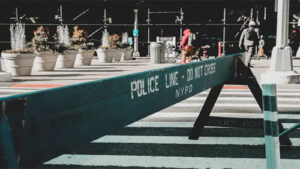
Third Mass Shooting This Week: Chaos Erupts Outside NYC Club as Gun Violence Spirals
In the early hours of Tuesday morning, the U.S. witnessed its third mass shooting in a single week, this time outside a bustling nightclub just miles from the heart of New York City. The attack left six people dead and at least 12 others injured, sparking yet another round of outrage, mourning, and the familiar chorus of “thoughts and prayers.”
The nightclub, a popular spot for young professionals, was packed when gunfire erupted, sending patrons scrambling for cover. Eyewitnesses describe a chaotic scene as shots rang out, shattering the relative normalcy of the night. Police have yet to release the name of the suspect, who reportedly fled the scene, but sources indicate that this was a targeted attack, not an act of random violence.
This marks the third mass shooting in the U.S. within seven days, reigniting debates over gun control, mental health, and public safety. Despite the frequency of these tragedies, meaningful legislative action remains elusive, and communities are left to pick up the pieces after each horrific event.
The Blame Game
Predictably, the political divide over gun control has resurfaced with renewed fervor. Advocates for stricter gun laws argue that the government’s failure to implement universal background checks, ban assault weapons, and limit high-capacity magazines has made such incidents almost inevitable. On the other hand, gun rights supporters claim the focus should be on addressing mental health issues and enforcing existing laws, rather than imposing new restrictions.
Meanwhile, many Americans are growing weary of the same tired arguments. Social media is flooded with outrage, grief, and a pervasive sense of hopelessness. “How many more have to die before we see change?” asked one Twitter user, echoing a sentiment that has become all too familiar.
A Nation Desensitized?
Perhaps the most alarming aspect of this shooting is not the tragedy itself but the public’s reaction—or lack thereof. As mass shootings become a grim fixture of American life, there is growing concern that the nation is becoming desensitized to such violence. Each incident sparks outrage for a day or two, only to be eclipsed by the next news cycle.
This desensitization is compounded by political gridlock. Despite the rising death toll, Congress remains paralyzed, with both parties blaming each other for the lack of progress. As lawmakers bicker, lives continue to be lost, and the cycle of violence shows no signs of abating.
The Path Forward
The question now is whether this latest tragedy will serve as a wake-up call or simply fade into the background, like so many others before it. Will policymakers finally prioritize the safety of their constituents over political interests? Or will this become yet another footnote in the ongoing saga of America’s gun violence epidemic?
One thing is clear: without decisive action, the bloodshed will continue. And as the nation grieves yet another mass shooting, the question remains—how many more lives must be sacrificed before change becomes inevitable?
Leave a Reply